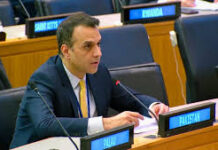ISLAMABAD, July 30 (Alliance News): The Senate Standing Committee on Water Resources, chaired by Senator Shahadat Awan, reviewed the slow progress on groundwater legislation, growing illegal encroachments along water bodies, and the prolonged delay in the completion of the Nai Gaj Dam project.
During the meeting, the Committee expressed serious concern over the pending compliance reports related to earlier directives issued in sessions held on January 9, February 6–25, and March 19, 2025.
The Ministry of Water Resources was directed to submit a consolidated report detailing implementation status, reasons for delays, and revised timelines.
The issue of vacant posts in the Federal Flood Commission (FFC) was also discussed. Out of 37 positions, 21 have been filled, while 16 remain vacant. The Chairman emphasized that such delays hamper the Ministry’s performance and must be addressed urgently.
Regarding the proposed Dams Safety Council, the Ministry informed that the Dams Safety Bill, drafted with support from the Asian Development Bank (ADB), has been submitted and is expected to be introduced in the House within three months after vetting.
A key concern raised by the Committee was the rise in illegal encroachments on natural waterways across the country. The Ministry and local authorities were instructed to initiate immediate action to remove these encroachments and submit a report identifying affected sites, responsible agencies, and clearance timelines.
The coordination between SUPARCO and FFC regarding monitoring encroachments was questioned, with the SUPARCO representative failing to satisfy the Committee. The Chairman ordered SUPARCO to coordinate with FFC and PID and present a comprehensive report within one month.
He also recommended an inquiry to fix responsibility on departments failing to act against encroachments.
The Capital Development Authority (CDA) was similarly directed to provide a detailed account of encroachments in Islamabad.
On the Nai Gaj Dam, WAPDA and Ministry officials reported that progress was delayed due to inflation and a funding deadlock. The Committee expressed strong concern over cost escalation and urged the government to approve the revised 3rd PC-1 within a month, and allocate necessary funds to meet the new completion timeline of June 2027.
Minister for Water Resources Moeen Watto assured the Committee he would take up the matter with the government urgently.
Regarding the National Water Policy and groundwater regulation, the Committee was informed that while Sindh, Punjab, and KP have passed Water Acts, their enforcement remains limited. Balochistan already has a water law, which is being updated through a new bill expected in the coming months. However, the Chief Engineer of Irrigation Balochistan acknowledged that regulation would only be fully functional once the new enactment is passed.
A representative from Khyber Pakhtunkhwa admitted that the province lacks comprehensive groundwater data, drawing concern from Senator Humayun Mohmand, who warned of worsening urban flooding and groundwater depletion due to unchecked construction and regulatory inaction.
The Secretary of Water Resources noted that the federal ministry has repeatedly communicated with provinces, but responses have been limited. The Committee stressed that provincial delays in implementation pose a threat to long-term water sustainability, and directed all provinces to submit updated implementation reports within a month, outlining legal instruments, enforcement status, and challenges.
The meeting was attended by Senators Poonjo Bheel, Saadia Abbasi, Humayun Mohmand, Saeed Ahmed Hashmi, and Khalil Tahir, along with senior officials from WAPDA, the Ministry of Water Resources, and provincial irrigation departments. The Committee reaffirmed the urgent need for coordinated water governance, strict enforcement, and timely institutional response to ensure sustainable water management.






